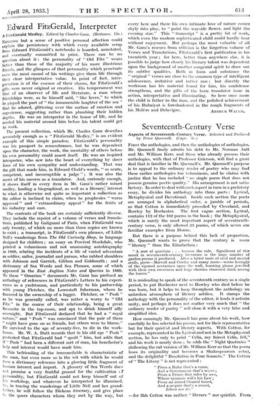Edward FitzGerald, Interpreter
A FitzGerald Medley. Edited by Charles Ganz. (Methuen. 15s.)
NoTnrwc but a sense of positive personal affection could explain the persistency with which every available scrap from Edward FitzGerald's notebooks is hoarded, annotated, and eventually committed to print.. There can be no question about it : the personality of " Old Fitz " wears better than those of the majority of his more illustrious friends, and the glimpses of that personality which penetrate even the most casual of his writings give them life through their clear interpretative value. In point of fact, inter- pretation is of the essence of their charm, for FitzGerald's gifts were never original or creative. His temperament was that of an observer of life and literature, a man whose friendships were, as he himself said, " like loves," to which he played the part of " the innumerable laughter of the sea " that he adored, glittering over the surface of emotion and experience, suggesting rather than plumbing their hidden depths. He was an interpreter in the house of life, and he needed his material around him before his talent could get to work.
The present collection, which Mr. Charles Ganz describes accurately enough as a " FitzGerald Medley," is an evident example of this simple paradox. FitzGerald's personality was his passport to remembrance, but he was dependent upon the character, the work, the mentality of others before his own personality could assert itself. He was an inspired interpreter, who saw into the heart of everything by sheer force of his own sympathy and understanding. That was the gift that made him, in Edward Clodd's words, " so acute, competent, and incorruptible a judge " ; it was also the secret of his success as a translator. And, curiously enough, it shows itself in every item in Mr. Ganz's rather mixed medley, lending a biographical, as well as a literary; interest to what is otherwise not quite so important a collection as the editor is inclined to claim, when he prophesies " warm approval " and " extraordinary appeal " for the fruits of his industry and care.
The contents of the book are certainly sufficiently diverse. They include the reprint of a volume of verses and transla- tions, published by Galignani of Paris, when FitzGerald was only twenty, of which no more than three copies are known to exist ; a transcript, in FitzGerald's own phrases, of Little Nell's wanderings from The Old Curiosity Shop, in language designed for children ; an essay on Percival Stockdale, who printed a voluminous and not unamusing autobiography in 1809, relating the incidents of a life of varied adventure as soldier, sailor, journalist and parson, who rubbed shoulders with Johnson and Garrick, Gibbon and Goldsmith ; and a dictionary of Sea Words and Sea Phrases, some of which appeared in the East Anglian Notes and Queries in 1869. To these " Omarian " documents Mr. Ganz has prefixed an anthology of references in FitzGerald's Letters to his experi- ences as a yachtsman, and particularly to his partnership with young Fletcher, the Lowestoft fisherman, whom he financed in the ownership of a lugger. Fletcher, or " Posh " as he was generally called, was rather a worry to " Old Fitz " in the course of their relationship, being a great favourite in the tap-room, and apt to drink himself silty overnight. But FitzGerald declared that he had a " royal nature," and " Posh " was convinced that the pair of them " might have gone on as friends, but others were to blame." He survived to the age of seventy-five, to die in the work- house. Mr. W. A. Dutt records that in his old age " Posh " protested that FitzGerald had " spoilt " him, but adds that if " Posh " had been a different sort of man, his benefactor's help and interest would have made him.
This befriending of the irreconcilable is characteristic of the man, but even more so 'is the wit with which he would turn a dictionary reference into a glowing little fragment of human interest and import. A glossary of Sea Words does not promise a very fruitful ground for the cultivation (:f personality, but FitzGerald could not keep himself out of his workshop, and whatever he interpreted he illumined. So, in tracing the wanderings of Little Nell and her grand- father, he will follow the Dickens itinerary, and give place to the queer characters whom they met by the way, but every here and there his own intimate love of nature comes shyly into play, to " paint the wayside flower, and light the evening star." This " transcript " is a pretty bit of work, which even the modern sophisticated child could hardly hear without enjoyment. But perhaps the most valuable of all Mr. Ganz's rescues from oblivion is the forgotten volume of Verses and Translations, FitzGerald's first publication in his twentieth year ; for here, better than anywhere else, it is possible to judge how closely his literary talent was dependent upon the background of another congenial spirit to draw out its subtler qualities. Both in form and substance the " original " verses are close to the common type of intelligent adolescence, imitative and rather raw ; but directly the workman has his material found for him, his confidence strengthens, and the gifts of the born translator issue in action, interpretative and illuminating. So here once more the child is father to the man, and the polished achievement of his Rubaiyat is foreshadowed in the rough fragments of






































 Previous page
Previous page